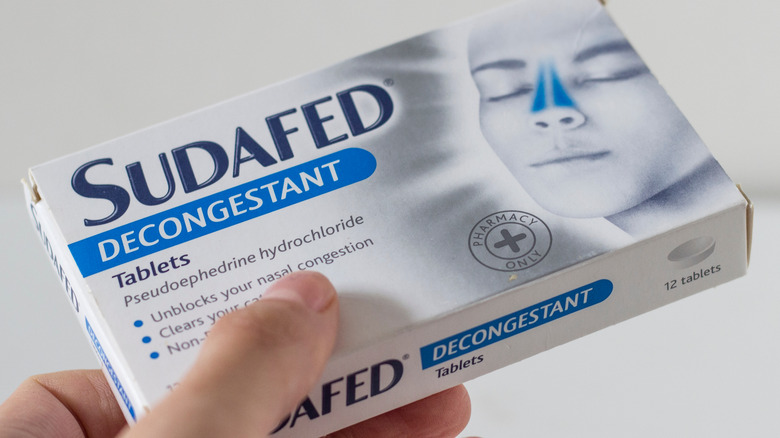When You Take Too Much Sudafed, This Is What Happens
Sudafed is a common over-the-counter decongestant many of us turn to when we need to relieve sinus or nasal congestion. The medication can be bought without a prescription, but you likely won't find it on store shelves due to federal regulations. According to Sudafed, the medication is not sold at the pharmacy or service counter due to the main ingredient of pseudoephedrine, a decongestant known for shrinking blood vessels in the nasal cavity. Pseudoephedrine can be used to make methamphetamine, which is why federal regulations were put in place to keep it behind pharmacy counters.
Blood vessels in the nasal cavity swell when you experience nasal or sinus congestion. Sudafed works to shrink those blood vessels, and in turn, opens the nasal passages, allowing your sinuses to drain. While you may temporarily need more tissues, clearing out the nasal passages should help you breathe better.
According to Healthline, how much Sudafed you take is going to depend on the form of the medication and your age. Sudafed is available in many different forms, including tablets and liquids, and dosage will vary per person. For Sudafed Congestion, adults and children over the age of 12 can take 2 Sudafed tablets every 4-6 hours. For children ages 6 to 11, only 1 tablet is needed every 4-6 hours, while children under the age of 6 should not use Sudafed. Remember: it's always best to check with your doctor first before trying a new medication.
Side effects of Sudafed
Typically, side effects are nothing to be concerned about when taking medication. However, taking too much Sudafed can result in unpleasant and potentially dangerous side effects. While you may not experience any side effects, it's important to know what to be on the lookout for if you accidentally take too much Sudafed. The National Health Service states that regular side effects of Sudafed can range from headache and dry mouth to feeling nauseous or restless. In some cases, taking too much Sudafed can result in serious side effects, such as an irregular heartbeat, fever, or small bumps on the skin. If you experience any severe side effects, you should immediately call 911.
Side effects of Sudafed can increase when you consume caffeine, reports WebMD. Some Sudafed medications include caffeine as an ingredient, so you'll want to keep track of your caffeine intake. A large amount of caffeine, or even chocolate, can set off side effects. To ensure you're taking Sudafed properly, you should only use the medication as directed by the manufacturer or your doctor.


